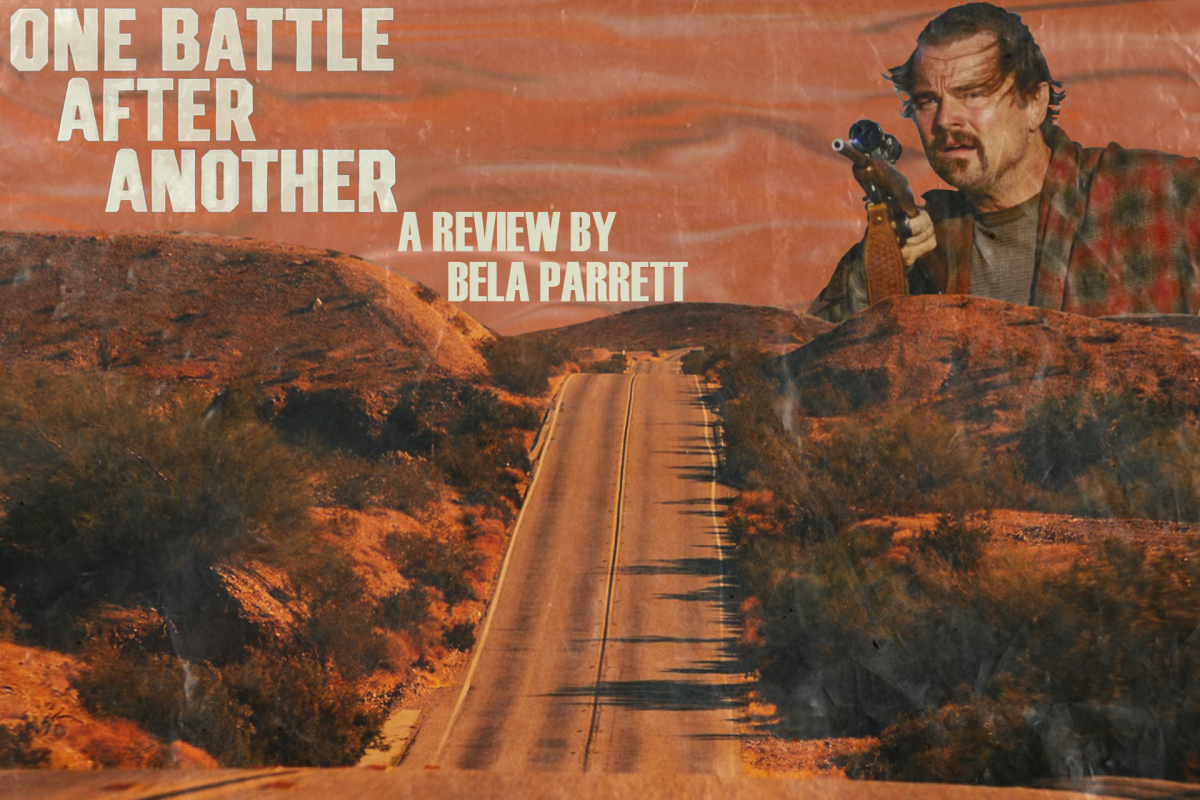Paul Thomas Anderson’s “One Battle After Another” is the shortest three hours someone could spend in a theater. It was thrilling, suspenseful and action-packed, while still being thoughtful and thematic.
The movie is a perfect medium between the indie film and a edge-of-your-seat blockbuster action, and watching it at Ragtag Cinema in Columbia was the absolute best place to see this film.
“One Battle After Another” is loosely based on the 1990 novel “Vineland” by Thomas Pynchon. The novel is set in 1984 and follows a former hippie revolutionary and his daughter in a game of cat and mouse with a demented, insecure military official.
The time period is ambiguous in the film, but it feels current. It’s assuredly dystopian, but uniquely set in the modern-day U.S. with current political struggles. The setting isn’t necessarily important, but the theme is universally meaningful.
The film begins with the story of Perfidia Beverly Hills, played by Teyana Taylor, who leads a revolutionary group called the French 75. The group perpetrated radical attacks like raiding a detention center and robbing banks in the name of freedom from an authoritative U.S. government 15 years before the main events of the film. Leonardo DiCaprio’s character Bob Ferguson is involved in the movement and with Perfidia Beverly Hills.
The film isn’t as idealistic about rebellion as movies like Star Wars; instead, it’s more realistically complicated and morally grey. For example, Beverly Hills was pressured by the perverted and severely insecure Colonel Lockjaw, played by Sean Penn, to rat out everyone in her group. She left behind her daughter Willa Ferguson, portrayed by Chase Infiniti, with Bob.
Despite having strong reasons to prioritize her movement and martyr herself for her cause, Beverly Hills focused on her self-interest, which happens even in the strongest political movements.
Anderson has always been a master of balancing funny moments in thoughtful content, making them as entertaining as possible. But he has never gone this far into the extremes of both comedy and action/thriller in one film before. It’s so full of emotion, which is why the film never fails to keep your attention.
“One Battle After Another” feels like Anderson’s unique take on a Coen brothers-style film. It’s as if The Dude from “The Big Lebowski” got thrown into “No Country for Old Men.” DiCaprio’s character is The Dude in this situation– an incompetent, washed-up, paranoid yet endearing stoner.
DiCaprio does a phenomenal acting job, not only as a lead but as comedic relief. For the majority of the film, he sports flip-flops and a robe. His simple comedic mistakes like falling out of a tree and not remembering a secret code makes the film unexpectedly twisty.
It is interesting that, for being one of the main protagonists, DiCaprio’s character makes little impact on the action or the drama. He is following along, trying to catch up to what’s going on with his daughter and Penn’s character, but is never really on time to impact important moments in the story.
The supporting cast really helps make the film as grand as it is. Interesting characters like Benicio Del Toro’s Sensei Sergio St. Carlos make the film feel like little snippets of a bunch of different people doing what they think is best. The bad and good characters encountered in this saga are differentiated between people fighting for the interest of their image, and people fighting for their belief in what is right.
Penn’s acting was also superb. His character’s fatal flaw is taking himself far too seriously, in both an intimidating and pathetic way. Lockjaw starts the whole thing because he wants to join a supremacist group. He has to clean his record in horrific ways to get accepted into a dorky extremist group that does more harm than it seems like it should have the power to.
This film was not about radicals against the system, but a more nuanced take about how people go about getting or even knowing what they want, both for themselves and society.
“One Battle After Another” was not a, ‘Yay, the good guys saved the day and everything’s okay now’ movie. It was very politically realistic–the fight between radicals and governments is a constant unending uphill battle that passes from generation to generation.
As DiCaprio gets old and loses his interest in keeping up the fight against prejudice and oppression, he focuses on raising his daughter who also ends up taking up the revolutionary calling, despite not knowing if their attempts at making change will ever succeed.
In all, “One Battle After Another” draws attention to interesting conversations without scaring off audiences with its pretentious runtime. It’s a perfect balance of interest, action and comedy that makes for an exciting and thoughtful theater experience.



